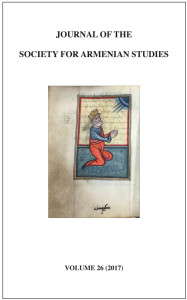Journal of the Society for Armenian Studies Releases Volume 26 and Appoints New Advisory and Editorial Boards
 The Society for Armenian Studies announces the release of Volume 26 (2017) of the Journal of the Society for Armenian Studies (JSAS), edited by Dr. Sergio La Porta. JSAS Volume 26 includes four articles, eight communications, and two book reviews.
The Society for Armenian Studies announces the release of Volume 26 (2017) of the Journal of the Society for Armenian Studies (JSAS), edited by Dr. Sergio La Porta. JSAS Volume 26 includes four articles, eight communications, and two book reviews.
The articles in this issue address topics in Armenian religious practice, philology, the Armenian Genocide, contemporary literature and the transmission of traumatic memory.
The volume begins with a study by J. Russell that takes a detailed look at the prayer or oath attributed to the sect of the Arewordik‘, or Children of the Sun, in Armenian sources. Although there is no evidence that the Arewordik‘ were Christians converts who continued to practice pre-Christian Zoroastrian faith in secret, Russell brings forth analogues with such communities to evoke the type of society in which incantations such as the one above circulated.
Russell’s article is followed by K. Bardakjian’s examination of the development of the origin of the title amira among Armenians in the Ottoman Empire. The study shows that the term began to circulate in Armenian around 1750, as the first attested occurrences of it appear in 1758. Finally, the paper examines tensions between this rising class of self-made men and the Ottoman Armenian ecclesiastical leadership.
Marutyan extracts contemporary discussions of incidents documented during the Armenian Genocide often interpreted as “rescues,” from the domain of an a priori denialist and propagandistic “just memory” formulations. Instead, it brings them into conversation with the principles set forth by the Institute of the “Righteous among the Nations” of the Yad Vashem Holocaust Museum. It is an attempt, therefore, to clarify the issue of “rescue” so that it may be prevented from being manipulated for political purposes.
Finally, H. Makhdoumian uses Patricia Sarrafian Ward’s The Bullet Collection (2003) as a case study to complicate postmemory. She argues that the novel calls for a more nuanced theoretical framework attuned to the intergenerational transmission of memories of exilic experiences, such as gazing back towards a lost home or homeland and establishing new transnational communities.
In addition to these articles, vol. 26 contains eight communications that address a broad range of Armenological topics. The first communication by M. Stone explores what he terms the “ornamented Bible” in Armenian, that is, the way in which the Bible was retold and taught through stories and interpretative traditions. Following that, A. Maghalyan publishes with an English translation the list of Catholicoi of the Ałuank‘ (Caucasian Albanians) from Matenaradan ms. 2561 (1664 CE), while E. CreMeens brings to light an unpublished Psalter and its illuminations from the library of the Armenian Museum of America. A. Sanjian then compares the prices and price fluctuations of Armenian newspapers published between 1918-1920. A. Arslanian’s communication looks at British policy towards the Armenians and other minorities in the Middle East during WWI and its immediate aftermath. Y. Tchekhanovets and Fr. P. Berjekian share excerpts from a report on excavations from the St. James Cathedral in Jerusalem in the 1950’s originally compiled by Bishop Shnorhk‘ Kaloustian.
The final two communications address issues involving Armenian diasporan travel to Anatolia and Western Armenia. C. Bertram presents the case of Armenian-American “pilgrims” who travel to the area of the Six Ottoman Armenian Provinces to visit specific villages of their ancestors and bring with them the traditional village music that they learned in the diaspora. In their qualitative study, M. Manoogian and A. Bakalian examine the motivations, actions, and outcomes of diasporan travel by focussing on the intergenerational transmissions in Armenian families as expressed in post-trip narratives of travelers to Anatolia.
As part of making JSAS more visible in the national and international academic arena the Executive Council of the Society for Armenian Studies in consultation with the Editor of the Journal for the Society of Armenian Studies has taken a couple of important steps which include submitting the Journal to a professional academic press and appointing distinguished scholars on its Advisory and Editorial boards. Society for Armenian Studies President, Bedross Der Matossian (University of Nebraska-Lincoln) commented: “We believe that doing so will make JSAS more accessible to the academic community at large and ensure that will have a greater impact on our scholarly disciplines. We are certain that the Journal will benefit from the expertise of the new boards and elevate its level to meet the highest academic standards.”
Sergio La Porta, California State University, Fresno continues as the Editor and the new Book Review Editor is Michael Pifer, University of Michigan, Ann Arbor. The Advisory Board consists of: Bedross Der Matossian, University of Nebraska, Lincoln; Barlow Der Mugrdechian, California State University, Fresno; Sharon Kinoshita, University of California, Santa Cruz; Eliz Sanasarian, University of Southern California; Alison Vacca, The University of Tennessee, Knoxville; and Fariba Zarinebaf, University of California, Riverside. The Editorial Board consists of: Sebouh Aslanian, University of California, Los Angeles; Stephan Astourian, University of California, Berkeley; Houri Berberian, University of California, Irvine; Tamar Boyadjian, Michigan State University; Talar Chahinian, California State University, Long Beach; Peter Cowe, University of California, Los Angeles; Lerna Ekmekcioglu, Massachusetts Institute of Technology; Christina Maranci, Tufts University; Hratch Tchilingirian, University of Oxford; Simon Payaslian, Boston University; Uğur Ümit Üngör, Utrecht University; and Heghnar Watenpaugh, University of California, Davis.
The Journal of the Society for Armenian Studies is a peer-reviewed journal and is published annually by the SAS. Copies of the latest volume, and back issues, are available by contacting the SAS Secretariat at 559-278-2669 or by email at barlowd@csufresno.edu. Copies may also be ordered online at societyforarmenianstudies.com.







